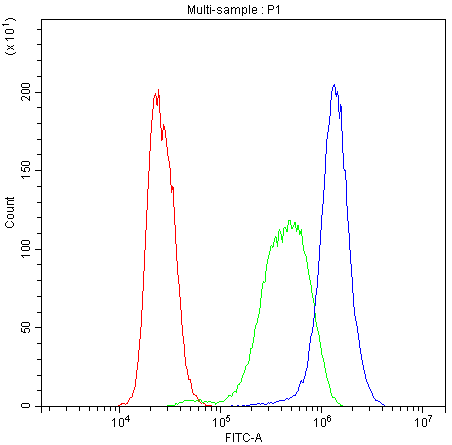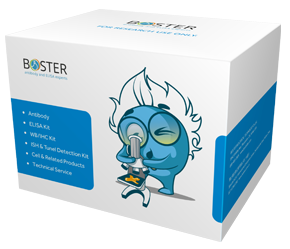Product Info Summary
| SKU: | A00334-Dyl488 |
|---|---|
| Size: | 100 μg/vial |
| Reactive Species: | Human |
| Host: | Rabbit |
| Application: | Flow Cytometry |
Customers Who Bought This Also Bought
Product info
Product Name
Anti-Human Caspase-3 DyLight® 488 conjugated CASP3 Antibody
SKU/Catalog Number
A00334-Dyl488
Size
100 μg/vial
Form
Liquid
Description
Boster Bio Anti-Human Caspase-3 DyLight® 488 conjugated CASP3 Antibody catalog # A00334-Dyl488. Tested in Flow Cytometry applications. This antibody reacts with Human.
Storage & Handling
At -20°C for one year from date of receipt. Avoid repeated freezing and thawing. Protect from light.
Cite This Product
Anti-Human Caspase-3 DyLight® 488 conjugated CASP3 Antibody (Boster Biological Technology, Pleasanton CA, USA, Catalog # A00334-Dyl488)
Host
Rabbit
Contents
Each vial contains 50% glycerol, 0.9% NaCl, 0.2% Na2HPO4, 0.02% NaN3.
Clonality
Polyclonal
Isotype
Rabbit IgG
Immunogen
E.coli-derived human Caspase-3 recombinant protein (Position: T67-D175). Human Caspase-3 shares 86% and 90% amino acid (aa) sequence identity with mouse and rat Caspase-3, respectively.
*Blocking peptide can be purchased. Costs vary based on immunogen length. Contact us for pricing.
Cross-reactivity
No cross-reactivity with other proteins.
Reactive Species
A00334-Dyl488 is reactive to CASP3 in Human
Reconstitution
Observed Molecular Weight
39 kDa
Calculated molecular weight
31.608kDa
Background of Caspase-3
Caspase 3 is a caspase protein which interacts with Survivin, XIAP, CFLAR, Caspase 8, HCLS1, Deleted in Colorectal Cancer, TRAF3 and GroEL. This gene which is located on 4q35 encodes a protein that is a member of the cysteine-aspartic acid protease (caspase) family. Sequential activation of caspases plays a central role in the execution-phase of cell apoptosis. Caspases exist as inactive proenzymes that undergo proteolytic processing at conserved aspartic residues to produce two subunits, large and small, that dimerize to form the active enzyme. It is the predominant caspase involved in the cleavage of amyloid-beta 4A precursor protein, which is associated with neuronal death in Alzheimer's disease. And the caspase-3 activation in heart failure sequentially cleaves SRF and generates a truncated SRF that appears to function as a dominant-negative transcription factor. Additionally, the caspase-3 influence on bone mineral density should be considered in any in vivo application of caspase-3 inhibitors to the treatment of human disease. In erythroid precursors undergoing terminal differentiation, Hsp70 prevents active CASP3 from cleaving GATA1 and inducing apoptosis.
Antibody Validation
Boster validates all antibodies on WB, IHC, ICC, Immunofluorescence, and ELISA with known positive control and negative samples to ensure specificity and high affinity, including thorough antibody incubations.
Application & Images
Applications
A00334-Dyl488 is guaranteed for Flow Cytometry Boster Guarantee
Assay Dilutions Recommendation
The recommendations below provide a starting point for assay optimization. The actual working concentration varies and should be decided by the user.
Flow Cytometry (Fixed), 1-3μg/1x106 cells
Positive Control
FCM: K562 cell
Validation Images & Assay Conditions

Click image to see more details
1. Flow Cytometry analysis of K562 cells using anti-Human Caspase-3 antibody (A00334-Dyl488).
Overlay histogram showing K562 cells stained with A00334-Dyl488 (Blue line). To facilitate intracellular staining, cells were fixed with 4% paraformaldehyde and permeabilized with permeabilization buffer. The cells were blocked with 10% normal goat serum. And then incubated with rabbit anti-Human Caspase-3 Antibody (A00334-Dyl488,1μg/1x106 cells) for 30 min at 20°C. Isotype control antibody (Green line) was rabbit IgG (1μg/1x106) used under the same conditions. Unlabelled sample (Red line) was also used as a control.
Protein Target Info & Infographic
Gene/Protein Information For CASP3 (Source: Uniprot.org, NCBI)
Gene Name
CASP3
Full Name
Caspase-3
Weight
31.608kDa
Superfamily
peptidase C14A family
Alternative Names
Caspase-3; CASP-3; Apopain; Cysteine protease CPP32; CPP-32; Protein Yama; SREBP cleavage activity 1; SCA-1; Caspase-3 subunit p17; Caspase-3 subunit p12; CASP3; CPP32 CASP3 CPP32, CPP32B, SCA-1 caspase 3 caspase-3|CASP-3|CPP-32|PARP cleavage protease|SREBP cleavage activity 1|apopain|caspase 3, apoptosis-related cysteine peptidase|caspase 3, apoptosis-related cysteine protease|cysteine protease CPP32|procaspase3|protein Yama
*If product is indicated to react with multiple species, protein info is based on the gene entry specified above in "Species".For more info on CASP3, check out the CASP3 Infographic

We have 30,000+ of these available, one for each gene! Check them out.
In this infographic, you will see the following information for CASP3: database IDs, superfamily, protein function, synonyms, molecular weight, chromosomal locations, tissues of expression, subcellular locations, post-translational modifications, and related diseases, research areas & pathways. If you want to see more information included, or would like to contribute to it and be acknowledged, please contact [email protected].
Specific Publications For Anti-Human Caspase-3 DyLight® 488 conjugated CASP3 Antibody (A00334-Dyl488)
Loading publications
Recommended Resources
Here are featured tools and databases that you might find useful.
- Boster's Pathways Library
- Protein Databases
- Bioscience Research Protocol Resources
- Data Processing & Analysis Software
- Photo Editing Software
- Scientific Literature Resources
- Research Paper Management Tools
- Molecular Biology Software
- Primer Design Tools
- Bioinformatics Tools
- Phylogenetic Tree Analysis
Customer Reviews
Have you used Anti-Human Caspase-3 DyLight® 488 conjugated CASP3 Antibody?
Submit a review and receive an Amazon gift card.
- $30 for a review with an image
0 Reviews For Anti-Human Caspase-3 DyLight® 488 conjugated CASP3 Antibody
Customer Q&As
Have a question?
Find answers in Q&As, reviews.
Can't find your answer?
Submit your question
4 Customer Q&As for Anti-Human Caspase-3 DyLight® 488 conjugated CASP3 Antibody
Question
We have observed staining in human tongue. Are there any suggestions? Is anti-Human Caspase-3 DyLight® 488 conjugated antibody supposed to stain tongue positively?
Verified Customer
Verified customer
Asked: 2020-02-24
Answer
From what I have seen in literature tongue does express CASP3. From what I have seen in Uniprot.org, CASP3 is expressed in jejunal mucosa, t-cell, tongue, lymph, cervix carcinoma erythroleukemia, among other tissues. Regarding which tissues have CASP3 expression, here are a few articles citing expression in various tissues:
Cervix carcinoma, and Erythroleukemia, Pubmed ID: 23186163
Lymph, Pubmed ID: 15489334
T-cell, Pubmed ID: 7983002, 7774019
Tongue, Pubmed ID: 14702039
Boster Scientific Support
Answered: 2020-02-24
Question
We are currently using anti-Human Caspase-3 DyLight® 488 conjugated antibody A00334-Dyl488 for human tissue, and we are satisfied with the Flow Cytometry results. The species of reactivity given in the datasheet says human. Is it true that the antibody can work on goat tissues as well?
Verified Customer
Verified customer
Asked: 2019-12-18
Answer
The anti-Human Caspase-3 DyLight® 488 conjugated antibody (A00334-Dyl488) has not been tested for cross reactivity specifically with goat tissues, but there is a good chance of cross reactivity. We have an innovator award program that if you test this antibody and show it works in goat you can get your next antibody for free. Please contact me if I can help you with anything.
Boster Scientific Support
Answered: 2019-12-18
Question
My boss were content with the WB result of your anti-Human Caspase-3 DyLight® 488 conjugated antibody. However we have been able to see positive staining in tongue cytoplasm. using this antibody. Is that expected? Could you tell me where is CASP3 supposed to be expressed?
M. Zhang
Verified customer
Asked: 2018-07-26
Answer
According to literature, tongue does express CASP3. Generally CASP3 expresses in cytoplasm. Regarding which tissues have CASP3 expression, here are a few articles citing expression in various tissues:
Cervix carcinoma, and Erythroleukemia, Pubmed ID: 23186163
Lymph, Pubmed ID: 15489334
T-cell, Pubmed ID: 7983002, 7774019
Tongue, Pubmed ID: 14702039
Boster Scientific Support
Answered: 2018-07-26
Question
I am looking for using your anti-Human Caspase-3 DyLight® 488 conjugated antibody for negative regulation of activated t cell proliferation studies. Has this antibody been tested with western blotting on k562 cells? We would like to see some validation images before ordering.
Verified Customer
Verified customer
Asked: 2017-07-28
Answer
We appreciate your inquiry. This A00334-Dyl488 anti-Human Caspase-3 DyLight® 488 conjugated antibody is tested on k562 cells. It is guaranteed to work for Flow Cytometry in human. Our Boster guarantee will cover your intended experiment even if the sample type has not been be directly tested.
Boster Scientific Support
Answered: 2017-07-28




